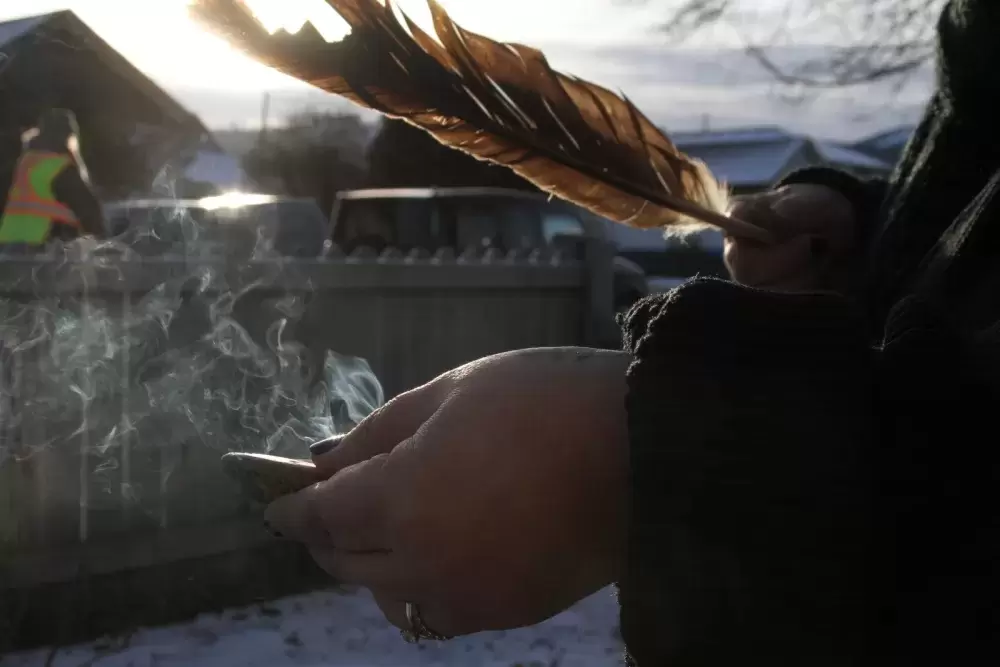Candice Servatius, the mother of two students who attended Port Alberni’s John Howitt Elementary School back in 2015/16 was in the B.C. Court Appeal on June 5 and 6 seeking to have Justice Douglas Thompson’s Jan. 8, 2020, ruling overturned.
The plaintiff sought to have smudging and other Indigenous cultural practices banned from the provincial public school system.
The case was heard in the B.C. Supreme Court in Nanaimo in November 2019. During the trial the court heard testimony from several witnesses to a school event that featured an Indigenous smudging demonstration for children attending John Howitt Elementary School in Port Alberni in September 2015.
The following January, students at the school were called to an assembly where they saw a performance by an Indigenous hoop dancer, who, during his presentation, said a prayer in his language over the microphone.
Servatius, a Christian, alleged that her daughter, then age 9, was forced to attend the smudging event against her will. She sought assurances from the school that her children are not exposed to “the explicitly supernatural and religious nature of the cleansing ritual”.
Dissatisfied with the outcome of her communications with the school, Servatius brought the matter to court, facing off with the School District 70 (Alberni) Board of Education and the Attorney General of British Columbia.
During the trial, counsel for Sevatius, Jay Cameron and James Kitchen of the Alberta-based Justice Centre for Constitutional Freedoms, argued that the school imposed the ceremony on the children and by doing so, infringed on their right to freedom of religion, according to the Canadian Charter of Rights and Freedoms.
The plaintiff sought a court order that would ban smudging along with “religious or spiritual rituals, cleanings, ceremonies and prayer” during mandatory school time throughout the province.
In his January 2020 ruling, Justice Thompson wrote he did not agree that the children were coerced to partake in a smudge ceremony.
The Nuu-chah-nulth Tribal Council were intervenors in the case because their education workers work in the public school system, bringing Nuu-chah-nulth culture and language through education agreements with the district.
The tribal council opposed the cultural prohibition order Servatius sought because it would, in effect, hinder the work that the school district and the NTC have accomplished in terms of bringing Indigenous culture into the schools.
Justice Thompson concluded that the intention of the school district was not to profess, adopt, or favor Indigenous spirituality, “but to teach about Indigenous culture and to help make Indigenous students feel like they belong to JHES.”
Stating that there was no infringement of Servatius’ or her children’s freedom of religion, her petition was dismissed.
In February 2020 the Justice Centre for Constitutional Freedoms announced it would file an appeal seeking to have Justice Thompson’s order quashed. In addition, they seek a declaration that SD70’s conduct in imposing a mandatory presence during spiritual practices of a religious nature infringed the rights of Mrs. Servatius and her children to the freedoms and conscience and religion.
Further, they are seeking an order prohibiting the school district from “engaging in or facilitating practices that are religious in nature… during any time when student attendance is mandatory”.
NTC President Judith Sayers was in the courtroom for the appeal trial. She noted that JCCF lawyers were arguing that Justice Thompson did not properly apply the test for the Charter of Rights on freedom of religion.
“A complex legal argument,” she said.
Sayers said that the court has to determine if the smudging demonstration and the hoop dancer's prayer before he performed were religion.
“If they were not religion, then there can be no breach,” she added. “We have maintained as NTC that smudging is not religious as it is our culture, way of life, and we do not have an organized religion.”
The JCCF is representing Servatius free of charge. According to their website, they are “a Canadian legal organization and federally registered charity that defends citizens’ fundamental freedoms under the Canadian Charter of Rights and Freedoms, through pro bono legal representation and through educating Canadians about the free society.” They are funded by non-government donations.
In a statement on their website, the JCCF said it thinks it was important to appeal the decision of Justice Thompson because “his decision did not properly consider the requirement that public schools be strictly secular – that there be no religious practices in public schools, and the meaning of the duty of state neutrality in matters of religion and conscience, that is the freedom of religion and conscience rights protected by section 2(a) of the Charter.”
They say Justice Thompson avoided considering these important issues by defining, or concluding, that the cleansing ceremony was only a demonstration.
Although the hoop dance was a way of prayer, and included a prayer, the children were only witnesses to it, not participants.
“JCCF strongly supports the rights of parents to educate their children in the faith or religion of their choice, and where children attend a public school, those parents have an expectation that the school will be secular - in other words, that there will be no religious or spiritual events at all, in the school,” said JCCF lawyer Karen Bastow.
The Court of Appeal is the highest court in the province. After reviewing the case, the appellate court can choose to uphold the lower court's judgment, or reverse the ruling entirely and return the case to the lower court for a new trial.
According to Sayers, a decision on the appeal will likely not be rendered for several months.

